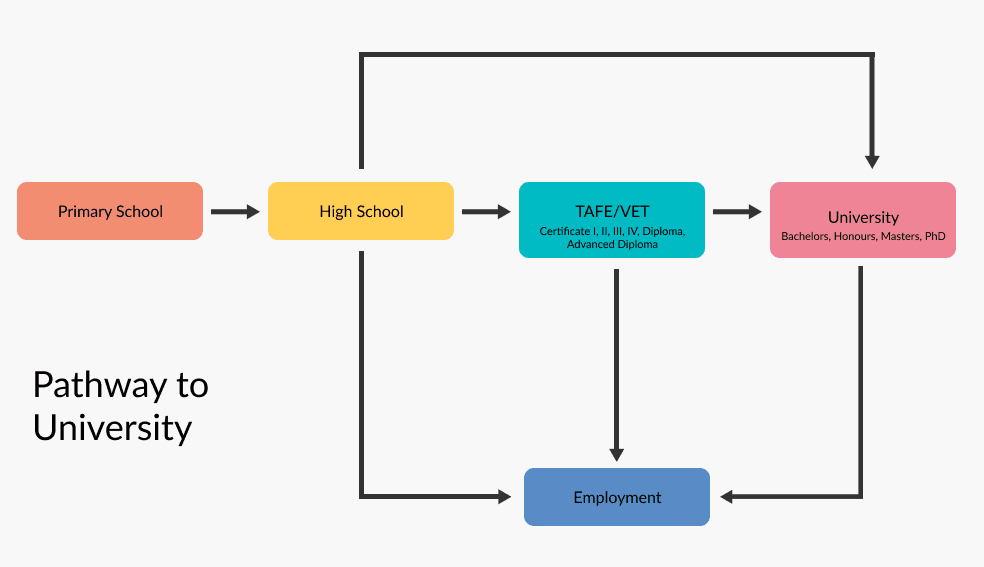9 Hands-on Benefits of Vocational Education and Training (VET)

Vocational training is a great way to study if you’re interested in working in a hands-on industry.
But what exactly is vocational education and training?
Vocational education and training (VET), is a practical education system that is nationally recognised as an alternative to higher education, which is usually more theory-based.
The Technical and Further Education (TAFE) sector adheres to the VET system, providing learners with real world experience while they learn. It is a government-owned initiative that adheres to national training guidelines to accommodate the needs of industries and businesses. Its aim is to optimise learning and professional development opportunities by providing learners with the practical skills required.
There are thousands of VET courses spanning across plenty of industries in the workforce. Fields of study that vocational schools and TAFEs provide courses for include:
No matter what industry you’re interested in, there will be a VET qualification suited to you.
Benefits of vocational education
Gain practical skills and real world experience
Vocational education and training places a heavy focus on learning practical skills that are essential to the career you’re pursuing. Unlike university, which primarily focuses on learning theoretical knowledge, VET courses ensure you are equipped with job-ready skills by the end of your study that will prepare you for the workforce.
On top of this, many vocational courses require you to complete work experience and placement. This is a great way to ease into the industry and find out what to expect, while also gaining job training and further expertise.
Better employment opportunities
VET isn’t only great for gaining vocational skills. In fact, many employers actually look for students who have completed vocational programs.
Having completed a VET course boosts your employment prospects — but not only through gaining skills and knowledge. By talking with other students in your course and completing work experience, you can increase your network and chances of employment. You may even be employed at your work placement after completing your course.
Immersive classes
VET courses involve immersive practical training classes to best prepare you for the workforce. Instead of doing a short class and taking home assignments to complete, VET training programs involve onsite training where you will learn the specific skills everything you need to succeed in that industry.
Plus, by being in a class full of other like-minded people, you will be able to network and build relationships.
Earn more than a University graduate
VET graduates actually earn a higher average salary compared to university graduates according to a study by Skilling Australia Foundation. Who doesn’t want to study for less time and earn higher wages?
Flexibility
There are thousands of VET courses to choose from, all accommodating for different lifestyle needs. There are an array of different study options including:
No matter what your learning preferences or schedule looks like, there will be a course that suits you.
Free TAFE
If you are looking to study a TAFE course in Victoria, the Victorian government offers Free TAFE courses for jobs that are in high demand. It’s a great way to get an education and enter the workforce, or change careers and not empty your hip pocket while doing so. By participating in Free TAFE, you are also helping the wider community and working in a fulfilling career that’s in high demand in the labour market. Since these industries are in need of new employees, a job in your field is almost guaranteed.
Pathway to University
Didn’t get the marks you were hoping for in high school? Don’t worry! VET and TAFE courses are a great pathway to university. TAFE courses are a great way to become eligible for university degrees if you aren’t just yet.

Great for a career change
If you’re growing tired of your current career and considering a change, VET courses are perfect for developing new skills. Vocational courses will help you gain the training you need for your new career path and can help you find employment.
Support services
Many TAFEs and vocational course providers have support services available. These services are more than happy to help guide you through your course, help you find placement and potential jobs after graduation through their partnerships. You won’t be left on your own!
Challenges of vocational training
Just like any education choice, there are also some downsides to vocational education.
Skills are often limited to that field
One downside about vocational education and training is that the courses can be limiting. The practical experience and immersive training is usually specific to the field you are studying and these technical skills sometimes can’t be transferred to other industries or careers.
However, if you know that this job is something you’d love to do, then that’s no problem! But if you’re still unsure or deciding between courses and career options, it may be best to wait until you’ve done all your research and make a choice you’re sure about.
Considered less ‘prestigious’
Unfortunately, there has been a long-standing cultural bias from Australians that vocational courses are less ‘prestigious’ and not regarded as highly as university. However, this is certainly not the case, and over the years this stigma has significantly reduced.
As stated above, VET graduates are sought after by employers, and even earn a higher average salary than university graduates. VET admissions soar year after year, so this false perception will soon be a thing of the past.
There are so many benefits to vocational training and education. If you study something you’re passionate about, you will reap the rewards and get the most you can out of the course.
Like the sound of VET but not sure where to start? Try our course navigator to find a course that interests you.


